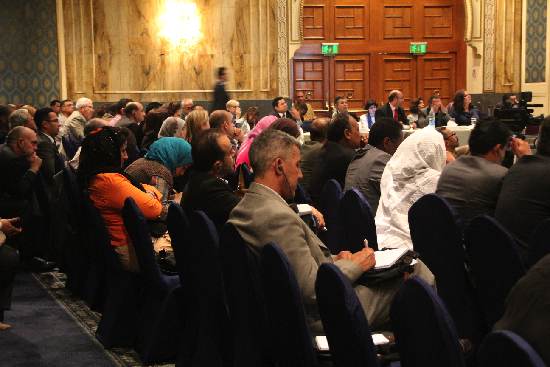Crucial Moment in Struggle for Justice in Middle East and North Africa
The international conference titled "Transitional Justice in the Middle East and North Africa: Opportunities and Challenges" began today in Cairo. Bahey eldin Hassan, director of Cairo Institute for Human Rights, opened the conference welcoming participants from Egypt, Tunisia, Libya, Syria, Sudan, Yemen, and other countries of the region and their guests from across the world.
Hossam al Gharyani, president of the Supreme Judicial Council in Egypt, welcoming guests from all corners of the globe, asserted that judges of Egypt have a long history of bravely struggling for freedom and the rule of law in this country.
He noted the three main challenges facing the judiciary of Egypt in the aftermath of the revolution as one of the only functioning pillars of the society in the absence of a democratically elected parliament, government of constitution. These challenges include the huge task in addressing the legacy of massive human rights abuses during the years of dictatorship; the pressure coming from the demonstrators who often pass judgments on people in the court of public opinion and expect courts to validate their verdicts; and the attacks on judiciary coming from different political parties as part of their pre-election campaigns.

Lucie Viersma, speaking on behalf of the High Commissioner for Human Rights emphasized the importance of transitional justice in today’s efforts to address legacies of massive human rights abuse and OHCHR’s record in addressing human right violations in the region
She outlined the principles and norms governing the normative boundaries of UN engagements, including the centrality of victims’ rights in any transitional justice process.
David Tolbert, president of the International Center for Transitional Justice, asserted that ICTJ is here to provide technical assistance and advice stemming from international experiences from a number of contexts, but that this is ultimately an Egyptian transition, in the hands of Egyptian people.
“The Egyptian revolution electrified the world as a truly a seismic event in the modern times. Now you have the responsibility to deal with the legacy of abuse and this is important not only for Egypt but other countries in the region, given the stature of Egypt. A successful transition here will set the standards for many other societies in the region and elsewhere," stated Tolbert. "A reckoning with the past, including the truth about human rights abuses, redress of victims, accountability of perpetrators, and institutional reform are cornerstones of such successful transition."
In closing of the introductory session, Bahey eldin Hassan of CIHRS described different events that preceded the conference, which place the efforts to achieve justice in a specific context.
“The transitional justice situation in Libya is getting more and more complicated with allegations of murder and torture committed by the revolutionaries emerging. In Yemen and Syria, issues are different with considerations whether to pursue criminal charges against the leaders there. And in Egypt questions are being asked whether we are retreating towards the practices of the past and the whether there will be any justice,” asserted Hassan.
He added that the trial of Hosni Mubarak is a great illustration, as the charges against him don’t include any abuses other than one incident of 28 January. “The main question is the existence of political will to have justice. Many people in Egypt believe that we are returning to the atmosphere of March 15 of 1954, when the road to democratic transition was blocked. These are difficult questions, but also questions that have faced other countries over the last century and I hope we will benefit from discussing them here today,” stated Hassan in conclusion of the opening session.
The conference continued with the session in which participants heard testimonies of victims of human rights abuses from Tunisia and Egypt.
